PHUKET: The parents of young tourists from Europe who have been killed or seriously injured on Thailand's roads are demanding better road safety.
Sadly, this will come as no solace to the grieving family and friends of the four young Swedes and their Thai driver, who died north of Phuket yesterday.
It was the region's worst tourism tragedy since 2009, when a dive boat capsized, killing six divers from overseas and their Thai cook.
Although the road toll on Phuket continues to trend down, there have been a series of bus crashes involving individual deaths and multiple injuries recently that indicate disaster is never far away.
And last year, six Burmese were killed when their pickup crashed with a tourist bus while descending the road from Phuket's Big Buddha, where they had been attending a religious ceremony.
The dangerous corner - where an Australian had perished on a crash through an elephant camp on his honeymoon the previous year - was widened and made safer within days.
But multiple deaths on Thailand's roads continue to be a too-frequent occurrence.
Thai authorities are aware of the need to better protect lives, but entrenched corruption sucks away funds from almost everything the country needs most: with improvements in education, health and transport at the top of the list.
Now five more senseless deaths have followed - young Swedes Johan Olof Nikolas Svensson, Frida Madeleine Falk, Anders Tobias Larsson, Elin Marita Hedbris, all aged 21 or 22, and driver Wichit Phromluang, 26.
Police will today be looking for the driver of the killer truck, who fled the scene.
It's a common occurrence, and it revived memories of another crash in Ranong province, north of Phang Nga province, where yesterday's fatal crash occurred.
We reprint a letter sent to us by a British mother, Rachel Cooper, last year:
''My 19 year old son was killed in a bus crash in Ranong District in May 2010. Our whole family and all his many friends have been devastated by his death.
''The bus driver was blamed by the police, but he 'ran away' and has not been brought to justice. However, the tyres on the bus were completely bald and yet the police did not question the bus owner.
''A Coroner's Court in the UK found that my son's death was 'entirely avoidable', and that the cause of the crash was the defective tyres and his death would have been prevented if seat belts were fitted and compulsory. The UK Coroner has sent a report to the Thai Authorities asking them for a response, but has had no response.
''Thailand has a horrendous record of fatalities on the roads (an estimated 22,000 per year - the rate in the UK is one tenth of this and we have the same population). Thailand's record is also far worse than all other countries in South East Asia (including India). The Thai Authorities are failing to enforce existing laws and regulations, and profit from tourism is being put before safety.
''I and the families of other tourists from the UK who have been killed in road accidents in Thailand are now beginning to campaign - both to raise awareness in the UK about the dangers of road transport in Thailand and the seeming lack of care about safety on the part of authorities.
''If Thailand is to continue to benefit from tourism it must do something radical to improve its safety standards. Then everyone (including all the tens of thousands of Thais who die needlessly every year) will benefit.
Yours faithfully
Rachel Cooper''
Alarmingly, Rachel later wrote that the driver had not been apprehended, and that ''despite the bus being in a totally wiped out condition, the bus owner was taking it to be repaired so it could be used as a death trap for others.''
''The police have a warrant out for the arrest of the driver but we know he will probably not be found (unless we go and find him), but although we believe he may well have contributed to the crash by driving, we are absolutely clear in our minds that the owner of the bus company should be held accountable for our son's death by:
i) not carrying out regular inspections of buses that travel these long distances (the forensic crash investigator at our son's inquest confirmed the tyres would have been bald for many days if not weeks)
ii) requiring drivers to drive excessive hours (and are probably therefore drinking stimulants to keep alert)
iii) setting timetables that mean drivers drive at excessive speed
''Also, it is clear from all the many discussions we have had with Thais and foreigners living in Thailand that the police often collude with the bus companies. Although in our case the investigating officer seemed to be a very genuinely caring and honest man, he did not interview the bus owner in any detail, and she was certainly not questioned about the state of the tyres, and there seems to have been no consideration of criminal proceedings against the bus owner or company (in the UK this would definitely have happened).
''At the moment we are just trying to get as much publicity as we can about the dangers of road transport in Thailand. The only way we can see the Thai Government putting real effort into ensuring existing laws are complied with is if they are worried about tourists staying away.
''The publicity storm that the families of the three London boys killed near Chang Mai in June 2011 have raised and the involvement of our MPs has resulted in:
a) the Thai Embassy contacting them directly to offer assistance
b) the UK Ambassador setting up meetings with the Thai Minister of Transport.''
Bruno Melling-Firth, Conrad Quashie and Max Boomgaarden-Cook, all aged 19 and enjoying a gap year break in Thailand, were killed last year when their bus collided with another bus on an overnight journey to Chiang Mai. About 40 other passengers were injured.
''The anniversary of my son's death (11 May 2011) was the launch date of the UN Decade for Action on Road Safety - we are trying to publicise this as widely as we can and to get people to ask their own governments what they are doing on road safety.
''We are also trying to publicise the fact that Thailand's statistics are far, far higher than other South East.Asian countries, despite it being a Middle Income Country. We want Thailand to properly report road deaths (most other countries in the world report a road death fatality if someone dies within 30 days of a road accident, but Thailand only reports it if the person actually dies at the scene).
''The UK coroner's recommendations were that there be more regular inspections (the crash investigator said tyres should be inspected before every journey - its obligatory in the UK for public vehicles) and fitting of seat belts as compulsory on coaches.
''It is probably easier for us being outside Thailand to raise these issues (and certainly when we visited Thailand we were encouraged to do so by Thais we met simply because they felt we might have more success). We are trying to work out a way of raising it within the tourism industry in Thailand.''

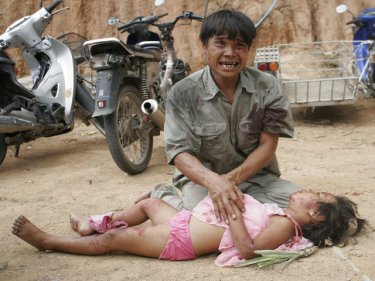




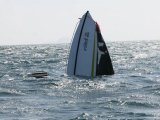

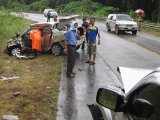
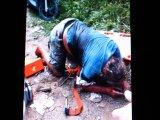
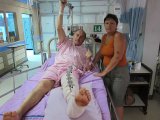



Dear Ed, I think the picture of a dead baby girl and her father is in bad taste and disrespectful to them. Readers can imagine what happens in accidents. I request that you replace it with if you have to a pciture with at the very least bodies that are covered as in your other pictures. Your readers are mostly foreigners where they would not see such graphic footage in their country. Please if not for me out of respect for the baby girl and her father replace the picture.
Posted by Adam on February 2, 2012 13:52
Editor Comment:
Most Western countries have had campaigns for road safety showing the graphic aftermath of crashes, whether real or simulated. That's how they shocked their citizens into realising they should be more aware, stop drinking and driving, and slow down. We have no wish to intensify this father's pain but we suspect he would be delighted if this real photograph saved just one child's life.